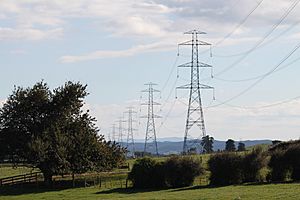Natural monopoly facts for kids
A natural monopoly happens when one company can provide a service or product to everyone more cheaply than two or more companies could. Imagine a town that needs water pipes. It makes more sense for one company to dig up the streets once and lay all the pipes, rather than having several companies each digging their own trenches. This is because the first costs (like digging) are huge, but adding more customers to the existing pipes is very cheap.
This situation creates a "monopoly" because it's very hard for new companies to start up and compete. They would have to spend a lot of money to build their own pipes or power lines, which isn't practical. Because of this, natural monopolies often include important services like water, electricity, and sometimes even internet.
Contents
What is a Natural Monopoly?
A natural monopoly is a special kind of monopoly. In a monopoly, one company is the only seller of a product or service. For a natural monopoly, it's not just about being the only one. It's about being the most efficient way to provide something.
Why Only One Company?
The main reason only one company works best is because of something called "economies of scale." This means that as a company produces more of a good or service, the cost per item goes down.
High Startup Costs
Think about building a huge power plant or a network of water pipes. The very first costs, called fixed costs, are enormous. You need to buy land, build the plant, and lay miles of pipes or wires. These costs don't change much whether you serve one customer or a million.
Low Extra Costs
Once the system is built, the cost to serve one more customer, called the marginal cost, is very low. For example, once water pipes are in place, sending water to one more house doesn't cost much extra.
Efficiency Through Scale
Because of these high fixed costs and low marginal costs, one large company can produce the service for everyone at a lower average price than several smaller companies could. If many companies tried to compete, they would each have to pay those huge fixed costs, making the service much more expensive for everyone.
Examples of Natural Monopolies
- Water Services: Building a network of pipes to deliver clean water to every home is very expensive. It wouldn't make sense for multiple companies to dig up the same streets to lay their own pipes.
- Electricity: Setting up power plants and a grid of transmission lines and poles is a massive investment. One company can manage this network more efficiently than many.
- Natural Gas Pipelines: Similar to water, laying gas pipelines across a region is a huge undertaking best handled by a single provider.
How Natural Monopolies Are Managed
Because natural monopolies provide essential services and face no competition, they could potentially charge very high prices. To prevent this, governments often regulate them.
Government Regulation
Governments usually step in to make sure these companies provide good service at fair prices. They might:
- Set Prices: A government agency might decide how much the company can charge for water or electricity.
- Oversee Service Quality: They ensure the company maintains its infrastructure and provides reliable service.
- Approve Investments: They might review plans for new power plants or pipe systems to make sure they are needed and cost-effective.
This regulation helps protect customers from unfair practices while still allowing the company to operate efficiently.
Images for kids
See also
 In Spanish: Monopolio natural para niños
In Spanish: Monopolio natural para niños
 | Laphonza Butler |
 | Daisy Bates |
 | Elizabeth Piper Ensley |



